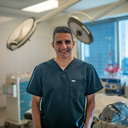Thank you for your question Lora. I understand your concern. Botox is a purified protein used to address wrinkles associated with facial expression. When injected into the skin Botox will relax the muscles and smoothen out the overlying wrinkles. The most common areas of treatment are in the upper face. These include the horizontal lines seen on the upper forehead when one raises the brows, the vertical lines seen between the brows when one frowns (frown lines), and the crow's feet seen around the eyes when one smiles.



















